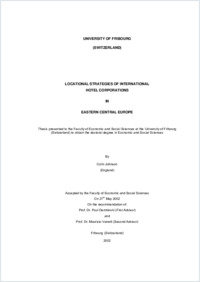Locational Strategies of International Hotel Corporations in Eastern Central Europe
- Johnson, Colin
- Dembinski, Paul (Degree supervisor)
- Vanetti, Maurizio (Degree supervisor)
-
27.05.2002
238 p.
Thèse de doctorat: Université de Fribourg , 2002
English
This study investigated expansion strategies of international hotel operators in Eastern Central Europe. Due to the growing importance of services in economic development, there is an impressive body of knowledge on the process of internationalization and service industries. The last comprehensive academic study on internationalization and the hotel industry was undertaken at the beginning of the 1990’s, however, and we believed that with the major changes impacting upon the industry due to the effects of technology and globalization, it would be useful to establish the important key factors in the internationalization process, along with the competitive advantages perceived by major international hotel companies. The second “gap” identified in the body of knowledge was that of hotel internationalization strategies in Eastern Central Europe. We therefore set out to identify which were the locational perceptions of senior hotel executives concerning Eastern Central Europe and ascertain the reasons for the form of involvement used in the hotel sector in the region. An in-depth review of the literature regarding internationalization was conducted, which evidenced that the most useful model for answering the questions was the eclectic paradigm as developed by John Dunning (1993). The paradigm has been used in many manufacturing and service sector studies, including that of the hotel sector (Kundu, 1994). However, it has not, to our knowledge, been used on a service sector industry in Eastern Central Europe. A questionnaire survey was conducted of the leading international hotel chains, framed around the three tenets of the eclectic paradigm, namely ownership, location and internalization advantages. It was decided to complement the analysis of Dunning’s eclectic paradigm with multivariate analysis of competitive and locational strengths, thereby permitting additional insights into the relative positions of the major companies, providing in effect a “photograph” of the market in Eastern Central Europe. Due mainly to the effects of new technology and globalisation on the hotel industry, there have been many changes in the last decade, including increasing consolidation and concentration and an increasing importance upon branding and financial performance. In relation to Eastern Central Europe there have also been monumental changes in the industry since the fall of communism, the main ones being significant increases in international arrivals and tourism receipts. Per capita spending by tourists to the region is, however, significantly behind the overall European average. Potential market sectors were discussed, with the most promising for Eastern Central Europe being an emphasis on “green or nature” tourism, cultural tourism, the tourist business market, especially meetings, incentives, conferences and events (MICE) markets, and finally the rejuvenation of the traditional spas and medicinal tourism of the region. An analysis of the hotel market was undertaken, with the conclusion being that the majority of the hotel stock in Eastern Central Europe was in the lower/mid-market sector, and was not up to international standards. It was apparent from the research that the time taken to internationalize by hotel chains had reduced significantly in the last decade. Only one-third of the companies in the study had representation in the study region, and concentration was heavily slanted towards two European hotel chains, Accor and Bass. Non-equity involvement was the most favored form of involvement, with 62% of the properties surveyed in the region being franchised properties. The ownership, locational and internalization advantages of the eclectic paradigm were analyzed in relation to the size of the company, the region of origin of the chain, and the level of internalization. Competitive advantages were considered in relation to other international hotel operators, and in comparison with indigenous hotel operators in Eastern Central Europe. Overall the ownership and locational advantages were more pronounced by size of company and region of origin than by the level of internationalization. The major company ownership advantages of international hotel companies in relation to other international hotel operators were knowledge of guest requirements, strategic planning and reservation systems. Ownership advantages were more pronounced against indigenous hotel operators in the region, and were marketing expertise, reservation systems and level of technological advancement of the company. Locational advantages identified for the region consisted of the size and nature of the city in which the hotel was to be located, the infrastructure within the region, and the perception of the region as an attractive business tourism destination. With regard to future developments, apart from the notable exception of the French hotel chain Accor, the locational strategies of international hotel companies are focused upon developing luxury hotels for international business tourists in the major cities of Prague, Budapest and Warsaw. This may be considered a conservative strategy that does not seek to exploit the domestic market or realize the full potential, especially in relation to Poland, which has over 15 secondary and tertiary cities of significance. This may be influenced by the fact that the perceived major barriers to development in the region are political instability, pervasive corruption and lack of international demand. Finally, the adequacy of the eclectic paradigm as the analytical framework for the study was discussed, and its advantages and disadvantages identified, together with its usefulness for further research.
- Faculty
- Faculté des sciences économiques et sociales et du management
- Language
-
- English
- Classification
- Economics
- License
- License undefined
- Identifiers
-
- RERO DOC 2632
- URN urn:nbn:ch:rero-002-102975
- Persistent URL
- https://folia.unifr.ch/unifr/documents/299581
Other files
Statistics
Document views: 349
File downloads:
- JohnsonC.pdf: 254
- JohnsonC.ps.gz: 113

